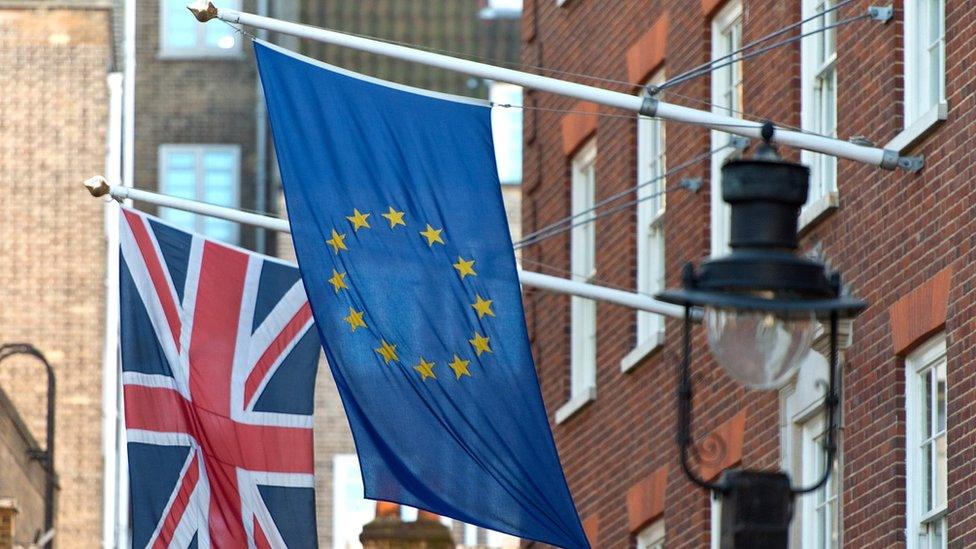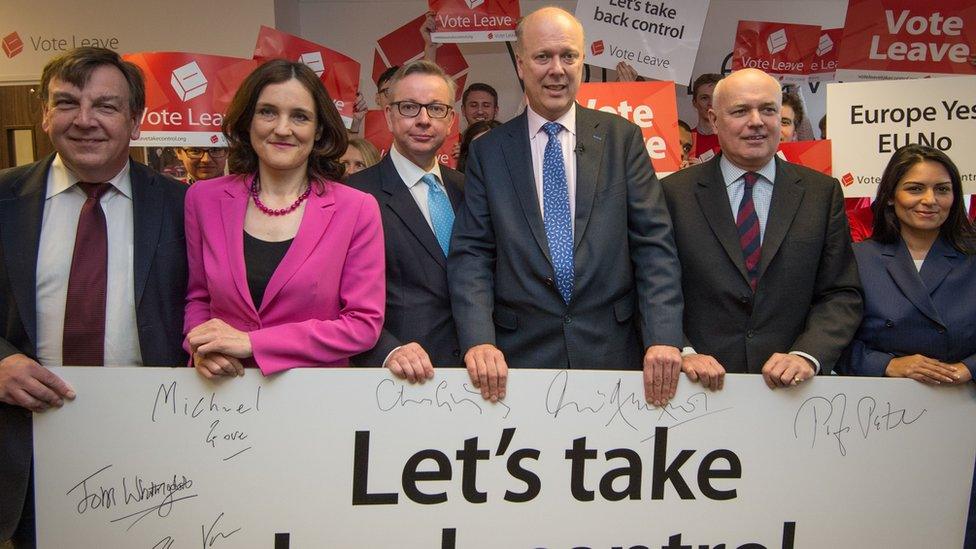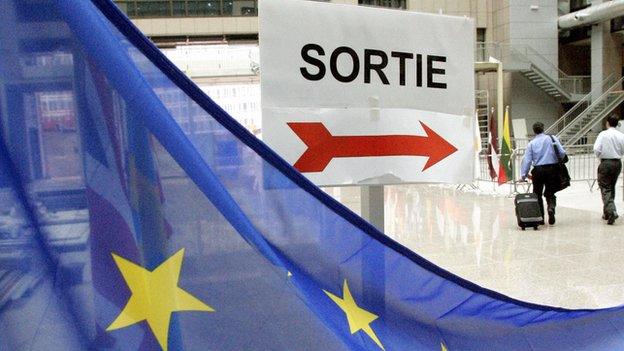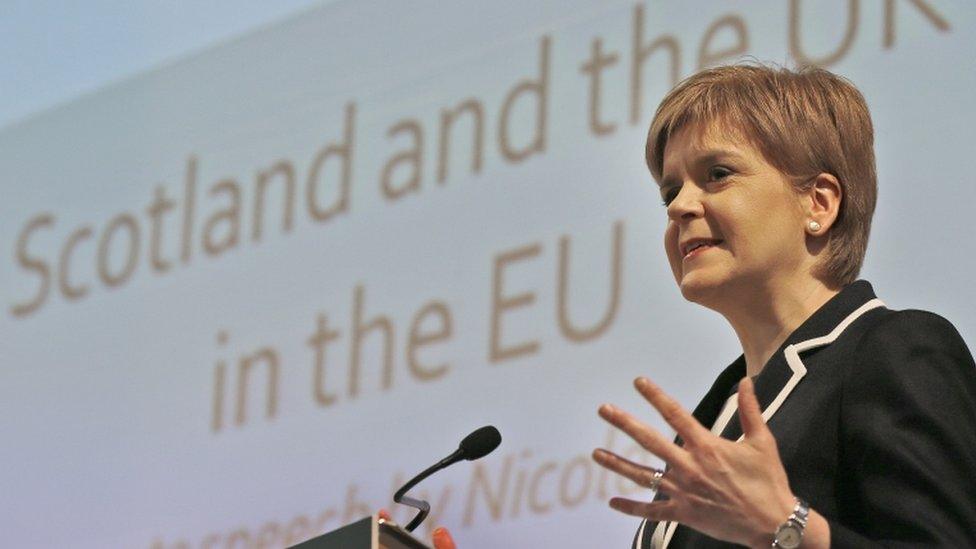EU referendum: Row over '10 years of uncertainty' claim
- Published

Ministers are warning of at least 10 years of "uncertainty" if the UK votes to leave the European Union.
A government analysis says the economy, financial markets and the rights of Britons living overseas could be affected during a complex negotiation to "unravel" the UK's membership.
But Commons Leader Chris Grayling, who is campaigning for a UK exit, said the 10-year claim was "ludicrous".
He accused the government of running a "relentless campaign of fear".
Meanwhile Scotland's First Minister Nicola Sturgeon, who wants to remain in the EU, warned David Cameron against fighting a "miserable, negative, fear-based" referendum campaign.
Read more:
Such accusations were rejected by Cabinet Office Minister Matt Hancock, who told BBC Radio 4's Today programme the government's analysis was "a cautious assessment".
He said it was "incumbent" on the Leave campaign to explain what would happen if it wins the referendum, adding: "There are real consequences of this for jobs and for livelihoods."
The government's assessment , externalof the exit process warns of a "complex negotiation" involving the 27 remaining EU member states, saying it would be difficult to complete a successful withdrawal inside the official two-year window.
Whitehall row
It says about two million Britons living in other EU countries have access to pensions, healthcare and other public services.
"There would be no requirement under EU law for these rights to be maintained if the UK left the EU," it adds.
"Should an agreement be reached to maintain these rights, the expectation must be that this would have to be reciprocated for EU citizens in the UK."
But Mr Grayling told the BBC: "Why on earth would we think it would take twice as long as the Second World War to be able to sort out our trading relationships with Europe and elsewhere?"
He said EU states had more to lose, because "they sell far more to us than we sell to them".

Would it take 10 years to leave the EU?
Tamara Kovacevic, BBC News

There is no precedent for a country leaving the EU.
Article 50 of the Lisbon Treaty sets out the process: negotiations would last two years and after that the UK would cease to be a member of the EU, unless the other 27 states unanimously decided to extend the negotiations.
When Greenland voted to withdraw from the European Community - the organisation that preceded the EU - in 1982 (after gaining a high level of internal autonomy from Denmark in 1979) a deal was reached three years later, after difficult and protracted negotiations, mainly over fisheries.
A deal for the UK is likely to be more complicated and the negotiations lengthier, especially if the UK wanted to retain full access to the single market.
The other 27 EU countries would be in charge of the timetable and a new deal for the UK would have to be approved by the European Parliament and the remaining 27 EU countries by qualified majority voting.
The UK would remain a member of the EU, under the current terms, for as long as the negotiations are ongoing.

London Mayor Boris Johnson also accused Remain of scaremongering, writing , externalin the Daily Telegraph: "They want us to go to the polls in such a state of quivering apprehension that we do the bidding of the Euro-elites, and vote to stay in the European Union."
The cabinet is split over whether to remain in the EU, with 17 full members in favour of staying in the EU and five wanting to leave.
On Monday afternoon Conservative MPs lined up in the House of Commons to criticise restrictions placed on official information given to those ministers backing an EU exit.
Cabinet Secretary Sir Jeremy Heywood's guidance says ministers opposing the official government line should not be given access to government papers on the referendum or Prime Minister David Cameron's EU renegotiations - apart from ones they had already seen.
Responding to an urgent question from Tory MP Bernard Jenkin, Mr Hancock said government was "functioning as normal" and that the restrictions would only apply to the specific in-out EU debate.
But backbenchers attacked the move. Michael Fabricant said it would appear "petty and vindictive" to voters, ex-defence minister Sir Gerald Howarth called it a "constitutional outrage", while former children's minister Tim Loughton suggested ministers would have to submit Freedom of Information Act requests to their own departments.

Ministers are able to campaign against the government in the EU referendum but conditions apply
Earlier Employment Minister Priti Patel said Sir Jeremy's action was "unconstitutional" and accused him of jeopardising the political impartiality of the Civil Service.
"Secretaries of state are responsible for their departments. For an unelected official to prevent them being aware of the information they need for their duties is wrong," she said.
Prime Minister David Cameron told an audience of students in Ipswich the row had "got slightly out of proportion" and the public should focus on the bigger issue of the merits of staying in or leaving.
The government is not neutral on the issue, he said, adding that ministers who back EU exit should not expect to see documents making the government's case for staying in as he would not expect to see papers prepared by campaign groups opposing EU membership.
- Published26 May 2016

- Published29 February 2016

- Published30 December 2020
